June 4th
June 4th is a fraught day where I come from. It marks the 1979 coup that overthrew the Acheampong regime even as it was due to return the country to civilian rule. Here's a stamp issued just a few months earlier: Colonial Mentality or Paradise Lost?
I did some daylong musings on the the legacy of June 4th over on Twitter, in between bouts of working from home and sheltering in place as one does in a pandemic. Feel free to join in the conversation, we all need comfort.
Now I know some continue to be seduced by the glamour of the coup and the motley crew it ushered into Ghana's politics. I rather think I should dwell on the 100th anniversary of the death of Sir Rowland Hill who, after all, introduced the Uniform Penny Post, and indeed the postage stamp. Humanity owes him fond rememberance.
Ghana had already lost its innocence in 1966 when the then President-for-Life was removed in a coup and we learned that no one is indispensable.
Ghana without Nkrumah, the cover of Africa Report magazine 1966. People seem to prefer photos rather than reading these days. Ah well, different strokes for different folks
Compare with the first published photo of Flight-Lieutenant Jerry Rawlings on the front page of the Daily Graphic conducting the head of state, General Akuffo around the Guard of Honor on February 16 1979. It is known that he had asked for the photo to be taken and published.
The long shadow of the military in Ghanaian politics.The iconography writes itself by simply juxtaposing Nkrumah, Akuffo and Rawlings. Rogues, guns, violence, death, democracy, blood and sin.
The brief Second Republic never had enough time to stabilize things hence the 1970s ushered in our first lost decade. The June 4th eruption simply sealed the deal. Here's a 1972 stamp, The Ghana Mace
The coup unleashed a spasm of unprecedented violence in the country. But we had fair warning. On trial for the earlier May 15 uprising, Rawlings said the solution lay in adopting the "Ethiopian way".
By the "Ethiopian way", Rawlings was referring to the Red Terror, the reign of unrelenting violence The Derg unleashed in Ethiopia. No Ethiopian would recommend that example. They, and all right-minded people, prefer bite-sized social grooming to vicious "cleansing" and terror.
Sidenote: the OAU had its main offices in Addis Ababa throughout the Red Terror when widespread torture and wholesale murder was taking place houses away. There was nary a peep from it during it all. Most African leaders were (are?) rogues, and our institutions follow the leaders.
Let's have a musical break: Follow the Leader by Eric B and Rakim. The militaristic percussion seems appropriate. Empty braggadocio was Rawlings's way when he was just my skinny Uncle Jerry in Soula Loop's gardens. Once empowered with the guns though...
Rawlings also mentioned the Ceylon example, the JVP insurrection in Sri Lanka of the early 70s. Messers Tsikata (Kojo and Tsatu) would talk of Sri Lanka to this young child's hearing. There is a direct line from the JVP to the horrors of the Tamil Tigers. Fellow travelers in blood.
"Rawlings also said there must be 'bloodshed' in order for the country to be cleaned and it must start from the Ghana army."
This last quote from a book I'll discuss later.
Many who cheered the blood then were later consumed by the revolution. Such are the wages of blood and sin.
Ghanaian market women still shudder to this day at the sight of khaki uniforms. The cheerleading chants of that era are as horrific as the acts the wrathful and misogynistic soldiers undertook: "Let the blood flow". "We no go let them pass".
We witnessed bloodlust and worse. Read Abena Asare's Truth Without Reconciliation: A Human Rights History of Ghana if you can bear to sample the raw material, even if digested for mostly bloodless reading
I do have a quibble with Abena Asare - The Wife shares most of her names. My minor beef is not with her considerable and assiduous research. No, rather it's with the title which, as a first time author, she probably didn't control.
If you read closely, the import of her work is rather that there was Neither Truth nor Reconciliation in Ghana. I don't think her editors bore the strength of her convictions. The stronger title would be more accurate. Whadya think Abena?
I understand the need to sell books, but I prefer the embrace of inconvenient truths. One lesson of the June 4th revolt is that the ordinary Ghanaian is enamoured of fictions.
Perhaps it's a defence mechanism, a protective shield against incoming blows. Our premier poet, Kwesi Brew, called it Ghana's Philosophy of Survival
Storytelling however is also a potent weapon in our cultural arsenal. Not for nothing, but we are all Children of Ananse, to take the title of Peggy Appiah's modernist take on the Ananse tradition. She defined Afrofuturism long before we had the language.
Death and Pain in Rawlings's Ghana was my Uncle Mike's account of those years. There's a lot of baggage in there but the facts, like the death and indeed the pain, are undeniable, however inconvenient they may be.
I had my own reading here: believe me it's not pretty
June 4th introduced the country to such huhudious acronyms as AFRC, the Armed Forces Revolutionary Council. Lazy journalists continue to reach for the obvious headlines: "The first coming of Rawlings". They use words like mercurial and charismatic. It's all political theater to them. The malign junta's acts were the most macabre theatre there was, sinister and horrific even.
Burnt by the Sun may be a Russian film but it carries a message that is a close companion to June 4th's legacy.
My good fried Naunihal wrote the book on coups, and June 4th, and the earlier May attempt form the centerpiece of Seizing Power: The Strategic Logic of Military Coups. Some read his book as a manual or guided counsel for rogues. I was an early reader and was part of the conversation that birthed it. For me, it's a cautionary tale in the best Ananse tradition. Naunihal, Ghanaian in spirit, loves folktales and uses them to make sense of the world
Naunihal had independently interviewed my parents for his research before putting together their relationship, and indeed that they were my parents. The four of us still chuckle about this serendipity.
My father was of interest because he had been head of Special Branch and ostensibly in charge of security in the Second Republic that fell to Kutu Acheampong's coup in 1972. I'm not sure he got much out of Dad. That coup's aftermath is an open wound on the paternal front. And more anon.
Here's a 1972 Ghanaian stamp, maize. The green of Ghana's flag refers to our fertile soil. These days we are fighting deforestation, and a 60+ year and ongoing USAID campaign to "open up our markets" to Big Corn and Big Agribusiness (Tyson, Tyson goes the chant). June 4th certainly didn't help matters. Our revolutions engendered near famine as our markets were ravaged, farmers were manhandled, market women were intimidated and all incentives lost. Political, economic and food precarity prevailed. These security men brought chaos and insecurity in every way.
My mother was of note because she was firmly in the mix during this period. She was appointed Acting Editor of the Daily Graphic the day before the execution of the 6 generals and military officers on June 27 1979. She had been literary editor weeks earlier when we witnessed the firing squad publicly dealing with the former head of state Ignatius Kutu Acheampong (he had been replaced by General Akuffo in a palace coup the previous year), and Major General Utuka, former Border Guards Commander for the most bogus of reasons.
She had to struggle to make the AFRC add Acting to her job title to signal that it was temporary and reviewable when constitutional rule returned. Capricious and arbitrary decisions were made by these rogues. They were inclined to remove or appoint people "with immediate effect". Obviously also, they weren't intending to leave, having tasted power.
Anyway, here's my visual antidote to the June 4th Revolt. My mum's book is my comfort suite.
Stand Up And Be Counted was the title of the editorial she published the next day. I recommend it to you
There have been public executions, public floggings of both men and women. Let all these organizations make their voices heard, surely a declaration of support would be a guide to our new rulers and so will a condemnation be also of help
After all, this entire house cleaning is done in all our names, as have all other previous actions and utterances by previous leaders been supposed to have been in our names.
It might be prudent to keep silent, but it will be the greatest gift ever given to Ghana if our opinion leaders will speak out
Right now it might look like it is a matter for "them"; the problem is that the distinction between a "them" and "us" does not always stay clear.
A quote from the poet John Donne puts is quite aptly: "No man is an island, entire of itself; every man is a piece of the continent, a part of the main;... any man's death diminishes me, because I am in mankind. And therefore never send to know from whom the bell tolls, for it tolls for thee".
Stand Up And Be Counted, the book, collects the editorials and columns she wrote in the aftermath of June 4th 1979. I bore her words proudly but, on the playground, I also learned that her's was not a wholy popular stance.
She had prime material to draw on for outrage in the aftermath of the June 4th coup. Take the following everyday caption:
Ordinary citizens receiving various forms of punishment for committing "economic crimes".
Above a "hoarder" receives an "identification haircut"; and below: A young man receives lashes from a soldier. Many people who attempted to flee such punishments were shot by armed soldiers like the one on the left holding the SMG sub-machine-gun.
One of countless women (second left in brassier with shaved head) abused by soldiers who claimed they were "economic saboteurs"
From Daily Graphic editorial: "Chivalry - Alive or Dead?", July 27 1979
Alfred Adu-Boahen, our foremost historian, would write in a later revolutionary time about the puzzle of The Ghanaian Sphinx. There were few overt acts of resistance, the voices that rose were snuffed out or shoved into exile. We looked inwards to our families and our churches.
I learned of the necessity of permanent outrage at my mother's feet and reading her columns at the Daily Graphic. Bad things were being done by bad men ostensibly in my name. I still cannot countenance the indifference to the onslaught of injustice anywhere. It's a visceral reaction for me.
There was of course a reaction: a considerable backlash from those in the grip by the revolutionary spirit. It was a perilous moment not just for Ghana, but for her and for us all. It was a dangerous thing to broadcast dissent as loudly and effectively as she did. Protests were summoned. I learned about courage in those days, even the playground was fraught when people knew your parents' names.
Sidenote: Some listening material. Witness: Ghana Coup. Amongst other things, this BBC piece tells the story of how Mum and I fled Ghana in 1982 after another coup.
The "E.O. Must Die" graffiti sprayed by the mobs near the Daily Graphic offices in July 1979 was still there when I returned to Ghana in 1986, and even in 1988. Ghanaians don't believe in maintenance whether painting walls or fixing broken windows. Deferred maintenance has been our norm. Here's hoping for change.
Tell a lie, there was a cleanup in advance of the 1992 elections. There was evidence of a fresh coat of paint on the Graphic's walls when I returned for my grandfather's funeral.
See also: How to hand over to yourself
Whoever said that rigged elections don't have fringe benefits? The Big Man puts money into people's pockets. Dusty roads suddenly get tarred, bags of rice magically appear in villages and neglected and rootless slum youth suddenly get employment.
An election, rigged or not, is a stimulus package.
It's not optimal economic policy, but it is policy nevertheless. I hear someone has been screaming "reopen the economy" around these parts looking forward to November. Heck, I was singing my protest anthem on The Grand Reopening of Texas just last month.
Gee kindly Doctor Fauci.
"Pot belly democracy" is the Ghanaian expression. "Stomach infrastructure" is the Kenyan term. African politicians know the deal.
Worth reading on this topic is A Dictionary of African Politics by Nic Cheeseman, Eloïse Bertrand, and Sa’eed Husaini. Observers are worried.
Incidentally Paul Nugent's Big Men Small Boys and Politics in Ghana is worth your while. Patronage politics runs deep, even with its revolutionary sheen in the Rawlings years. Tammany Hall was small fry compared to these rogues
There's a Dictionary of Revolutionary Justice to be written about the June 4th revolt. Choice terms that we all became familiar with include "economic saboteur" and "hoarder". The depraved champion was "identification haircut", wherein soldiers shaved recalcitrant saboteurs, often with blunt knives. The shaved head, often bloodied, was indeed their Ghanaian interpretation of the Scarlet Letter. The Mark of the Conquistador, as it were.
The thing is that June 4th 1979 was the antithesis of an election. These were conquerors who wanted a tabula rasa, a Year Zero, pace Pol Pot. The "Ethiopian way" is the most sinister thing I've ever heard. We had close encounters with the Heart of Darkness, it was brought to us by Rawlings and crew.
They had themselves a field day of blood and sin, and collateral damage, to our everlasting shame.
I once wrote, "You welcome the US to the fun of the Third World", but that was while discussing the West Nile Blues, an easier burden.
Americans enduring curfews, dismayed by unprovoked brutality and wrathful violence by men in uniform, and seeing tanks in the street might recognize some of what we Ghanaians went through after June 4th.
Per Will Self, there's a Quantity Theory of Insanity at work, and the quantum of insanity and violence from June 4th has been preserved and redistributed. It wasn't easy living and I don't envy those facing this kind of storm.
It helps to be prepared however, here's some more reading material, she had a gift for prophecy: The Coup Drill, a November 27 1979 editorial in The Daily Graphic
There is one thing, however, that has not and cannot change; the country is still agreed that coups d'etat have done more damage than what they set out to restore.
This is not simply a civilian sentiment as opposed to the military feeling. any soldiers, especially those who have any respect for their chosen profession, have said quite firmly that coups are not in the interest of the military.
No Government can ever get moving as we expect the Limann administration to do when there is talk everyday of coups...
The Graphic believes that this problem must be brought into the open and not spoken about in whispers. The country should make it quite clear to any future adventurers that might have such dreams that we are ready to face the situation.
The Coup Drill must be discussed openly until every citizen knows what is expected of him the next time anybody seizes Broadcasting House and tells us he has come to save us.
The Ghanaian equivalent of The Phoney War was the last 18 months of the Limann regime: the period from 1980 to 1981 when coup plots proliferated, and the whole country knew that the June 4th crew were itching to get back on the throne.
Ultimately, not enough Ghanaians practiced the coup drill, and 31st December 1981 would enjoin another more disastrous coup - the 18 years of PNDC rule neatly matching my mother's hasty disposession and exile in her prime years. Naunihal would argue about the military-civilian dynamics, economic malaise, and throw in the X-Factor of Colonel Gaddafi's support into his coup model, explaining why that coup worked. Truth be told, though, it was still a close run thing.
Here's a Third Republic stamp from 1980. It features the Supreme Court that would get neutered by the PNDC after its coup. Revolutionary justice was in the offing
Still we have learned many lessons from the past. There has been some modicum of Truth and Reconciliation since as I've suggested.
Back in 1981, we had a government that was not doing well and was a little over halfway through its mandate. We were denied the opportunity to vote out that government as it was overthrown and the rest, as the saying goes, is history.
It has been a long time coming, but we have come of age and Turkey can now come to us for some lessons in democracy.
Cultural Interpreters
Our great philosopher Kwasi Wiredu, had deep thoughts, book length even, about truth and reconciliation. As he puts it in Cultural Universals and Particulars:
Reconciliation is, in fact, a form of consensus. It is a restoration of goodwill through a reappraisal of the significance of the initial bones of contention. It does not necessarily involve a complete identity of moral or cognitive opinions.
It suffices that all parties are able to feel that adequate account has been taken of their points of view in any proposed scheme of future action or coexistence.
It seems to me that our traditional means of reconciliation were more effective than the modern commission that we instituted in this new millenium.
Whenever you discuss Wiredu, you have to discuss Kwame Gyekye, the twin towers of our philosophical thinking. Tradition and Modernity: Philosophical Reflections on the African Experience obliquely dealt with the cultural implications of the taboo breaking and wholesale impunity of the June 4th revolt. Gyekye did not favour a full frontal approach to rogue authority.
It stands to reason that both Gyekye and Wiredu are the "academic fathers" of that other cosmopolitan Kwame Anthony Appiah who I've found to be entirely too diplomatic to dive into the muddied soil of June 4th. Pity for him, there's fertile ground here, even if bloody.
My self image as a Child of Ananse is singularly helped by The Wife being Kwame Appiah's student. I'm married to Peggy Appiah's academic granddaughter by way of Wiredu. All that I'm missing is Kobina Sekyi, and I'll hit all the prominent Ghanaian cultural interpreters.
Instead of course, I have to be content to inviting these thinkers to my virtual dinner table to discuss toli and engage them on cultural observations and social interplay. I'd like them to weigh in on whether indeed Things Fall Apart beats Heart of Darkness in the School of Hard Knocks. We have to overcome the Shell Games of these gremlins and be mindful of Social Studies. It's a matter of lineage and social legacy, I'd ask Professor Busia if indeed democracy is of universal application and if conversational politics can survive contact with The Rough Beast.
I'd bring up the curfews, recalling the lasting effects of those earthquakes on our nightlife and cultural commons. I'd ask Kofi Annan, that global citizen, if we do stand tall at the center of humanity, or do we bow our heads in shame with the aftershocks on our psyche, soul tectonics. We ought to resist nostalgia and find our soul insurance in community and love for one another. It's my contention that our best response to these sinister depths is Social Living and abiding by the Mosquito Principle. And after all this weighty talk, our after dinner banter could continue with more light matters. Could participants join in on the importance of biting satire? We need our hatchet jobs for sure, as we tend to our polity, but ultimately is a country without whimsy worth worrying about?
I did the math, and I guess I was conceived in the aftermath of an earlier 1972 coup in Ghana, so perhaps, like former president Mahama (who made his bed and career with this baleful cohort, for shame), I could write a book on June 4th titled My First Coup.
But that would be derivative. Truth be told, I've already said my piece on that rotten lot, published right here in this joint. They don't call me Chief Toli monger for nothing.
Oh, you want links? Well, the titles tell the story:- Strange Bedfellows and the Journalistic Impulse
- Handling Rogues
- How to Hand Over to Yourself
- The Codes of Martial Music
- Ghanaian Fictions
- Bags and Stamps
- Poetry as Cultural Memory
- Huhudious (or Silly Season)
- He of the Little Green Book
I guess the closest I've gotten to personal history is in a recent elegy for a man in full, my Uncle Mike. One day perhaps, I'll write my own coup drill. I am mindful that I have a hard act to follow.
Heart of Darkness a playlist
Dancing in the dark. Music to soothe the soul as we journey down the river in search of Kurtz. June 4th birthed a generation of weary sons and daughters of Conrad in Ghana. Liner notes will follow
June 4th 1979
Death and Pain in Rawlings's Ghana
Stand Up And Be Counted
I did not have to wait
— The Wages of Thermidor
For the distance of history
In order to pronounce judgement.
Fin.
See also Truth and Reconciliation
File under: coup, history, Ghana, culture, observation, interplay, politics, family, personal, violence, perception, Heart Of Darkness, Africa, brutality, perception, cruelty, wrath, outrage, rogues, Things Fall Apart, toli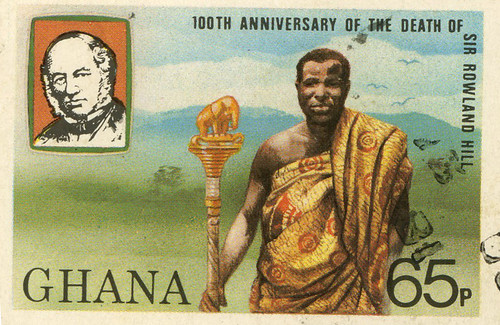

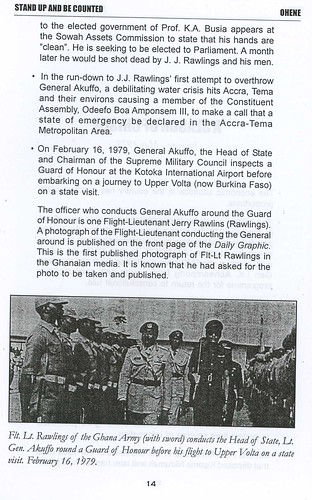
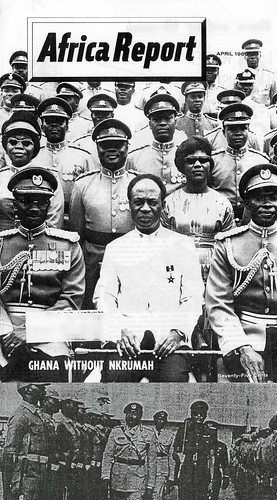



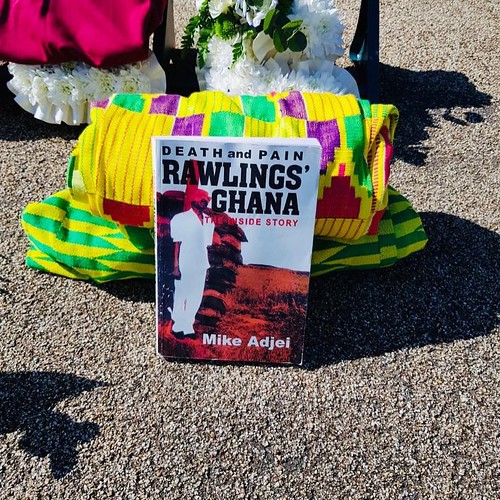

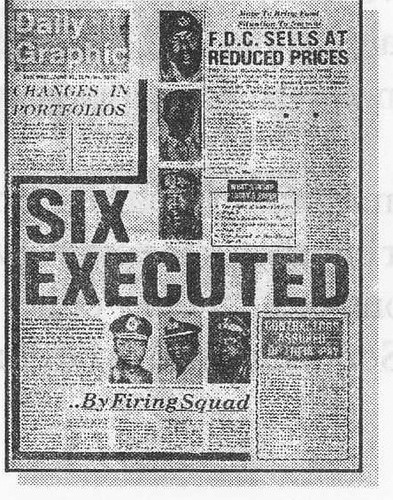

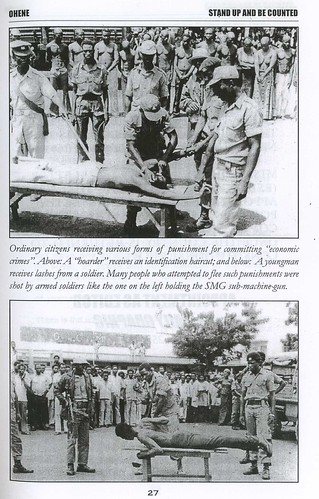
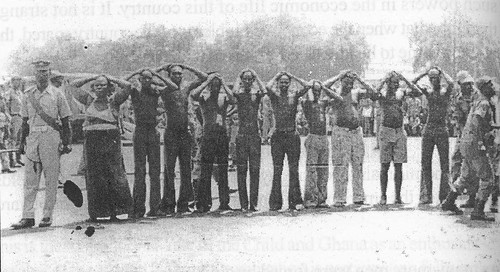
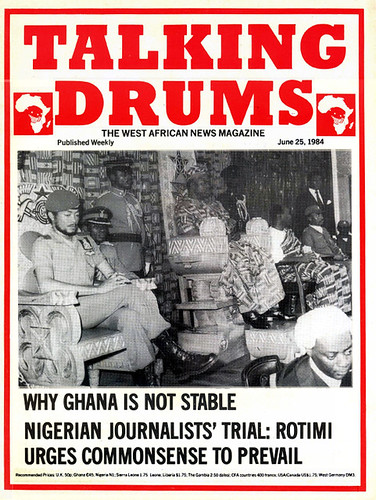

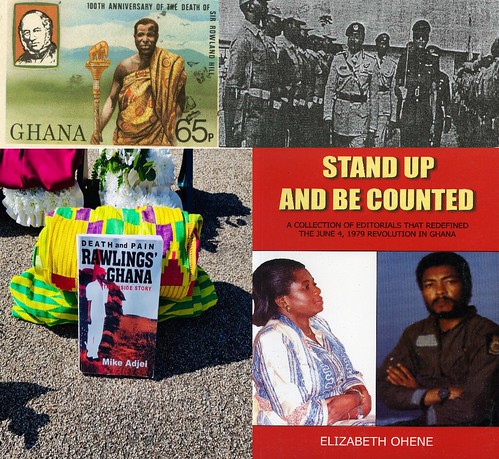

No comments:
Post a Comment